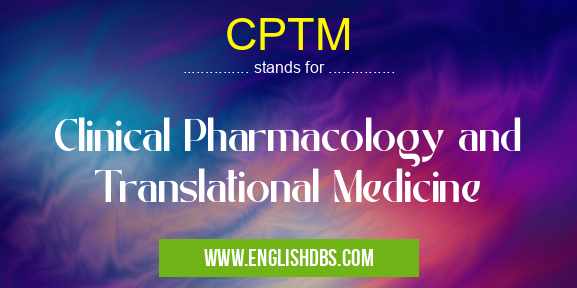What does CPTM mean in CLINICAL MEDICINE
CPTM stands for Clinical Pharmacology and Translational Medicine. It is a field of medicine that focuses on the study of how drugs and other therapeutic interventions affect the human body. CPTM research seeks to bridge the gap between basic science and clinical practice, with the ultimate goal of developing safer and more effective treatments for patients.

CPTM meaning in Clinical Medicine in Medical
CPTM mostly used in an acronym Clinical Medicine in Category Medical that means Clinical Pharmacology and Translational Medicine
Shorthand: CPTM,
Full Form: Clinical Pharmacology and Translational Medicine
For more information of "Clinical Pharmacology and Translational Medicine", see the section below.
Subfields of CPTM
CPTM encompasses a wide range of subfields, including:
- Pharmacokinetics: The study of how drugs are absorbed, distributed, metabolized, and excreted by the body.
- Pharmacodynamics: The study of how drugs interact with their targets in the body and produce their effects.
- Clinical trials: The design, conduct, and analysis of clinical trials to evaluate the safety and efficacy of new drugs and treatments.
- Translational medicine: The application of basic science research to the development of new treatments and therapies for patients.
Importance of CPTM
CPTM research is essential for the development of new and improved drugs and therapies. By understanding how drugs work in the body, researchers can design treatments that are more effective, have fewer side effects, and are better tailored to the needs of individual patients. CPTM also plays a vital role in ensuring the safety of drugs and other medical interventions.
Essential Questions and Answers on Clinical Pharmacology and Translational Medicine in "MEDICAL»CLINICAL"
What is the purpose of Clinical Pharmacology and Translational Medicine (CPTM)?
CPTM is a field that combines clinical pharmacology and translational medicine to develop and evaluate new drugs and treatments. It involves studying how drugs work in humans, how they are metabolized and excreted, and how they interact with other drugs and the body's own systems. This information is used to design new drugs and treatments, and to improve the safety and efficacy of existing ones.
What types of research are conducted in CPTM?
CPTM research includes studies on drug absorption, distribution, metabolism, and excretion (ADME), drug-drug interactions, pharmacokinetics, pharmacodynamics, and clinical trials. These studies are conducted in both healthy volunteers and patients with various diseases. The goal of CPTM research is to gain a better understanding of how drugs work in humans and to develop new and improved treatments.
What are the career opportunities in CPTM?
Graduates with a degree in CPTM can pursue careers in the pharmaceutical industry, academia, or government. They can work as clinical pharmacologists, translational researchers, or drug development scientists. Clinical pharmacologists design and conduct clinical trials to evaluate the safety and efficacy of new drugs. Translational researchers bridge the gap between basic science and clinical research, helping to bring new discoveries from the laboratory to the clinic. Drug development scientists work with pharmaceutical companies to develop and market new drugs.
What are the benefits of CPTM research?
CPTM research has led to the development of many new and improved drugs and treatments. These drugs have helped to improve the lives of millions of people around the world. CPTM research is also helping to develop new treatments for diseases that currently have no cure.
Final Words: CPTM is a rapidly growing field of medicine that is playing an increasingly important role in the development of new and improved treatments for patients. By bridging the gap between basic science and clinical practice, CPTM research is helping to make healthcare safer, more effective, and more personalized.
